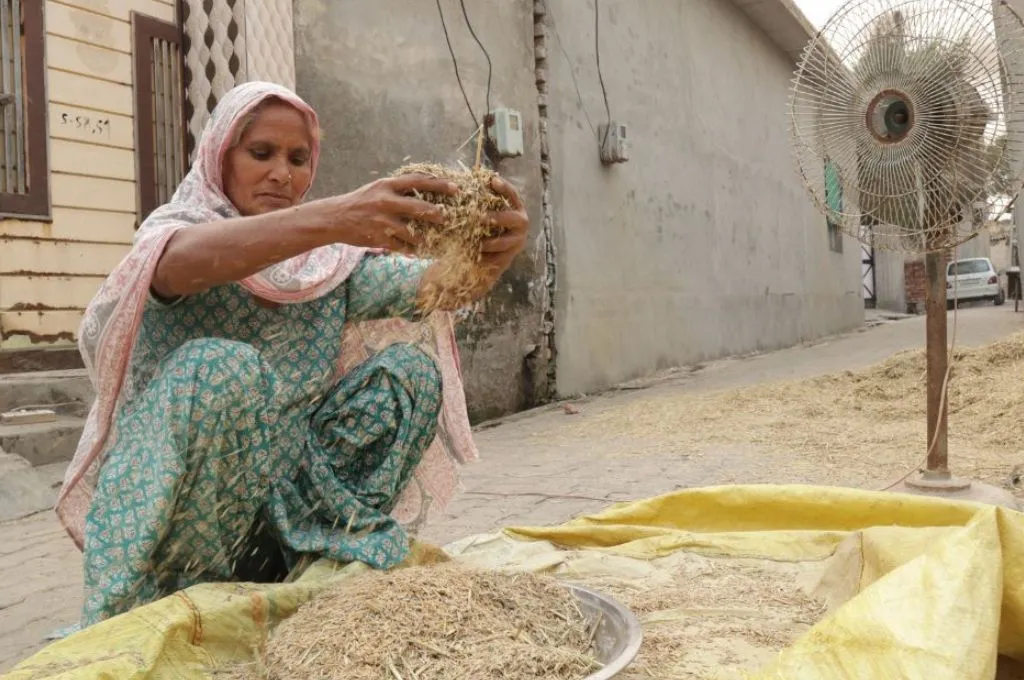The caste of farming in Punjab: Dalit women can’t afford land

In 2019, a group of 10 landless women from Changali Wala village in Punjab’s Sangrur district began organic farming on 1.5 acres of village common land. They were motivated by the desire to grow chemical-free food the hope for a better income.
These women, nine of whom belonged to the Dalit community of Ramdasia Sikhs, decided to cultivate land reserved for Scheduled Caste (SC) communities. They pooled in resources and leased the land for INR 55,000.
The women grew paddy, flowers, and vegetables, and sold them from a small roadside shop. “People were happy to buy our vegetables at double the market price because they were organic,” recalled Manjeet Kaur, one of the farmers.
The women managed all the tasks themselves—from preparing soil beds with hay or mustard stalks to making organic pesticide by boiling black plum, lemon, and guava leaves with fruit peels and chillies. They also used sour buttermilk and neem leaf spray to prevent pests.
In their first year, they earned a profit of approximately INR 60,000. However, in the second year, the COVID-19 lockdown of March 2020 reduced customer flow. Additionally, the lease amount on the common land went up to INR 78,000, affecting their earnings.
To sustain farming, the women had to reinvest their profits and draw from family incomes, straining already limited resources. This financial burden led four members to leave the collective.
By the third year, as the lease rose to INR 84,000, two more women decided to step away. With lease prices continuing to rise the following year, the women had to abandon the initiative.
“The high lease rates left us vulnerable,” noted Sinder Kaur, another farmer.
The women felt that they did not receive enough support from the village panchayat and sarpanch, who belonged to the same community and could have stabilised lease rates.
Under Punjab’s Village Common Lands (Regulation) Act, 1961, one-third of the cultivable land in each village is designated for SC communities. The local administration holds land auctions every April and May.
Mukesh Malaudh, president of the Zameen Prapti Sangharsh Committee—an organisation advocating for land rights for Dalits—explained that under the act, panchayats and block district officials have the authority to lease the common land to SC members for up to three years, “with an allowable annual increase of 10 percent on the established rate in subsequent years”.
According to the committee, massive protests by Dalit collectives in Sangrur district have led to reduced lease rates for village common land, averaging INR 20,000–22,000 per acre compared to INR 65,000–70,000 per acre for unreserved land.
However, leasing land often comes with social barriers, especially for Dalit women.
“Within the village, there is a sense of unease regarding women coming forward and farming on their own,” said Mukesh. “It is not that the villagers have a problem with Dalit women working in the fields—it is that these women are not labouring in landowners’ fields for meagre wages,” he added.
Sanskriti Talwar is an independent journalist who writes about gender, human rights, and sustainability. This is an edited excerpt of an article that was originally published on 101 Reporters.
—
Know more: Learn why the porters at the Attari–Wagah border are struggling.
Do more: Connect with the author on LinkedIn to know more about and support her work.



